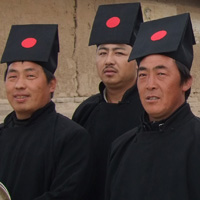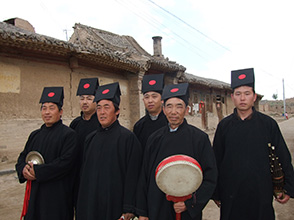Watch a Video
Wu Man discusses the other side of China.
Wu Man interview footage © 2009 The Carnegie Hall Corporation. Footage of Li Family Daoists and Zhang Family Band excerpted from Discovering a Musical Heartland—Wu Man’s Return to China; Andrea Cavazzuti, Cinematographer, and Director; Wu Man, Host and Artistic Director; special thanks to Sarina Tang; © 2009 Wu Man and Andrea Cavazzuti.
Related Essays
Ritual Daoism

Far from both the abstruse mysticism of Daoist philosophy and the celibate priests in the great urban and mountain temples, the main life of Daoism has long been found in small household groups of lay ritual specialists working to bring well-being to their local communities. Don’t ask these Daoists to tell you the meaning of life or to teach you meditation; what people do ask is for them to “do things” (banshi)—to perform rituals for communicating with the gods to grant practical blessings. Ordinary peasants with long hereditary traditions, they hand down complex ritual skills, ritual manuals, god paintings, magic talismans, and mantras within the family, performing long sequences for temple fairs, funerals, and occasional rituals for fulfilling vows, granting healthy sons, and establishing cosmic and social harmony—each lasting two to four days.
The Datong region in the north of Shanxi province, west of Beijing, is one thriving area for these groups (known here as yinyang); the Li family band is most prestigious in the county of Yanggao, with a heritage of some nine generations. The current leader is Li Manshan, son of the late great master Daoist Li Qing (1926–1999). Today’s senior masters were active throughout the early years of Maoism and revived after the Cultural Revolution.
Accompanying processions and rituals before the coffin or the god images are the sounds of the Daoists’ vocal liturgy and percussion ensemble, as well as exquisite incandescent melodic music led by the guanzi oboe and sheng free-reed mouth-organ, another vital part of north Chinese ritual music. Pacing the cosmos, by turns mournful (slow accompanied hymns) and comic (zany tricks with the wind instruments), they maintain their local communities in harmony through the healing forces of ritual and music.
Like all folk culture, this is a patchwork of elements reworked over many generations, and our main inspiration from the Yanggao Daoists is to witness a vibrant ritual heritage still serving folk society today, in a tradition that we can attest conservatively to have been unbroken for several centuries.
Program Notes
THE PROGRAM
Thanks to Wu Man’s intrepid explorations, this concert is a rare opportunity to savor two magnificently earthy folk groups from China’s poor dry northwestern countryside. No museum piece, no reconstruction, these vibrant ritual heritages still serve local communities today in traditions unbroken since the imperial period, their patchwork of elements reworked over many generations.
ZHANG FAMILY BAND
Shadow-puppetry remains in rural areas of Gansu and Shaanxi provinces. In Shaanxi, the Zhang family band, based in Shuangquan village in Huayin county (on the Guanzhong plain east of Xi’an), tours the nearby countryside to perform rugged dramas at temple fairs and rituals for the well-being of families. The majority of this performance consists of the hoarse singing known simply as “old tune” (laoqiang) that is based on shadow plays. The senior singer Zhang Ximin brings to life the mythical heroes and gods of the oral folk culture of Shaanxi, often evoking famous battles of the Tang dynasty (618–907) as portrayed in The Story of the Three Kingdoms. The guttural singing is accompanied by a concise battery of loud percussion, shawm, yueqin moon-lute, fiddle, and long natural trumpet—all rivaling the voices in their gritty style.
This style was popularized further afield in the soundtrack of Zhang Yimou’s amazing 1992 film The Story of Qiuju, echoing the fashion for the rugged “northwest wind” style of pop music, of which Cui Jian was a pioneer. The efforts of cultural officials have recently led to staged performances in Beijing and Shanghai, as well as on Chinese TV.
Round Sun and Crescent Moon in the Heavens: This is the stirring overture from a recent
spoken play Plain of the White Deer, arranged by local scholar Dang Anhua. The lyrics
explore the complementary tasks and resulting feelings of peasant men and women.
A Bright Pearl in the Sea: An ode to battle sung by the Tang general Qin Qiong.
“Shiyang jing” (Instrumental): Instrumental interludes punctuate the drama, resting the puppeteers’ voices.
All Desolate on the Eastern Campaign (Puppets): A drama evoking the threat to the Tang empire from the Korean kingdom of Koguryo.
Ancient Song of the Guanzhong Plain: The gods and generals may have created the landscape, but peasant life must go on.
The Won-Done Song: The poem, a meditation on the vanity of human ambitions, comes from Cao Xueqin’s celebrated 18th-century novel The Story of the Stone.
Three Heroes Do Battle with Lü Bu (Puppets): This excerpt is a dialogue between the celebrated ancient warriors Zhang Fei and Lü Bu as they do battle.
The General’s Orders Stir the Mountains and Rivers: Another martial song, this inspires the troops’ preparations for battle.
LI FAMILY DAOIST BAND
Daoism is the most ubiquitous form of religious practice throughout rural China today. Far from both the abstruse mysticism of Daoist philosophy and the celibate priests in the great mountain temples, the main life of Daoism has long been found in household groups of lay ritual specialists.
Still in northwest China, in Shanxi province east of Shaanxi, the Li family band of lay Daoist priests has a family heritage of some nine generations. Based in Yanggao, a county in the far north of Shanxi, they are ordinary peasants, paid to perform rituals. Li Manshan’s father Li Qing (1925–1998) was the most revered Daoist master in the area. He and his colleagues were active throughout the early years of Maoism (despite a reduction in ritual activity) and continued after the end of the Cultural Revolution. The group also includes Li Manshan’s brother (Li Yushan) and son (Li Bin). The magnificent and unassuming wind player Wu Mei, from a nearby village, became a disciple of Li Qing while in his teens. Apart from isolated visits to festivals in Beijing (1990) and Amsterdam (2005), they have served their local community throughout all the upheavals of modern Chinese history—the Japanese invasion, civil war, political campaigns, and chronic poverty.
Don’t ask these lay Daoists to tell you the meaning of life, or to teach you meditation; instead of philosophizing, they “do things” (banshi), performing two- to four-day rituals to communicate with the gods, requesting practical blessings for individual families and the whole community—mortuary rituals; temple fairs; and occasional rituals for fulfilling vows, granting healthy sons, and establishing cosmic and social harmony.
The Daoists individually choose auspicious days for action and appropriate sites for this world and the next, using their almanacs and luopan compass. In their public role, they perform in groups with a whole set of complex ritual skills based on hereditary manuals. At temple fairs and funerals (where they accompany processions and rituals before the coffin or the god images), they recite scriptures, prepare the written texts required for communicating with the gods, display images of the gods, chant mantras, depict magic talismans, sing hymns, and play percussion.
If the exquisite incandescent melodic music for sheng free-reed mouth-organ and guanzi oboe (performed by lay ritual specialists throughout the north Chinese countryside) is perhaps the best-known aspect of their performance, it is only one part of their complex ritual practice. Pacing the cosmos, by turns plangent and comic (watch out for Wu Mei’s zany tricks with wind instruments), the Daoists maintain their local communities in harmony through the healing forces of ritual and music.
This evening, the Li Daoists perform an abbreviated version of ritual segments they present to the gods for a temple fair.
Procession with Ritual Percussion and Conch: The Daoists are allotted a “scripture hall” in
which they rest and prepare the written documents required for their rituals. Each time they
emerge on procession through the village to perform a ritual, they announce their coming
with percussion and conch.
Vocal Liturgy, Hymn Sequence: On arrival at the altar, the Daoists perform a sequence of hymns in praise of the gods, seeking blessings for the community and the absolution of sins, standing before the god statues and altar table laden with offerings.
Instrumental Suite: The melodic instrumental repertory of suites, known as “holy pieces,” is played in strict sequence throughout the day and night, alternating with the vocal scriptures. The suites progress from solemn melodies to a series of short fast pieces.
Vocal Liturgy, Hymn Sequence: Vocal hymns are often accompanied by the melodic instruments, and form a moving part of the Daoists’ ritual sequence.
Medley of Pieces from Local Opera, with Clowning: Part of the Daoists’ ritual program (in sections like “Releasing the Pardon” and “Judgment and Alms”) is designed to entertain mere mortals. A sequence of popular pieces from local Errentai vocal music, and even pop, leads into Wu Mei’s astounding “catching the tiger” clowning sequence when the others act as stooges.
Chasing the Five Quarters (Percussion with nao and bo Cymbals): This is the climax of the spectacular “Raising the Pennant” ritual, along with the depiction of magical talismans and the “precious sword” in the earth at the foot of the five poles. At the end of this ritual, the cloth envelope beneath the flag at the top of the high central pole is untied, releasing walnuts, dates, and candies to the excited crowd below. This symbolizes the feeding of the hungry ghosts and bounty for the community.
—Stephen Jones
© 2009 The Carnegie Hall Corporation.


